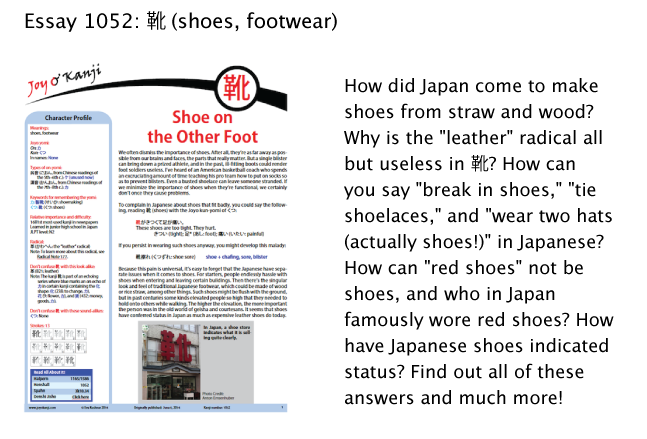Through a Pane of Glass
I'm going to do something forbidden. That is, I'll share the Verbal Logic Quiz from the new essay 1052 on 靴 (shoes, footwear), which means that I'm also giving away the answer. That's a no-no, right? But who created that rule? I did, so I think I'm allowed to break it if I want!
Anyway, here's the quiz: What do you suppose the following yojijukugo could mean?
隔靴掻痒 (かっかそうよう) to separate + shoes + to scratch + itchy
a. being frustrated because something is not quite as hoped
b. having a desire to straighten up shoes in a genkan
c. feeling itchy after wearing shoes made of rice straw
d. contracting poison ivy by having one's shoes brush against it in the woods
I'll block the answer with a preview of essay 1052.

And now the answer:
a. 隔靴掻痒 (かっかそうよう: to separate + shoes + to scratch + itchy) means "being frustrated because something is not quite as hoped." That is, it's frustrating to have an itchy foot that one cannot scratch (as hoped) while wearing shoes.
I mention this because one dictionary provides a fun sample sentence:
外国語を使って話をするということはしばしば隔靴掻痒の感を伴う。
It is often frustrating to try to express ourselves in a foreign language. It's just like kissing a beautiful woman through a pane of glass.
外国語 (がいこくご: foreign language); 使う (つかう: to use); 話をする (はなしをする: to talk); しばしば (often); 感 (かん: feeling); 伴う (ともなう: to bring with)
I didn't realize until now how much the translation deviates from the original! The Japanese says nothing about kissing, a beautiful woman, or a pane of glass. Meanwhile, the English mentions nothing about shoes or itchy feet.
Perhaps the person who translated the sentence into English thought it would be way too hard to convey the shoe-itch concept. After all, it comes from ancient China, having appeared as a metaphor in The Gateless Gate, a 13th-century Chinese book of Zen koans. That may seem far removed from the reader's experience, but who hasn't had an itch they couldn't scratch?
Nevertheless, I like the pane-of-glass analogy very much. And I'm grateful to anyone who can convey the frustration of losing clarity, nuance, and wit in the process of speaking another language. I've long felt that managing this frustration is the key to mastering Japanese. I am horrible at tolerating frustration, and yet if that's what this linguistic adventure brings with it (伴う, ともなう: to bring with), I must learn to handle the feelings.
As I prepare to travel in Japan next week, intending to speak more Japanese than ever before, I wonder yet again how I'm going to squash the immense frustration that is sure to arise at every turn.
How do you handle it? I would love to know. Please tell me! For all my interactions with Japanese people who want to perfect their English and all my contact with people who are wrestling with Japanese, I have discussed this very little. What do you do when you find yourself hitting your head against that pane of glass?
On past trips to Japan, I've told myself that I'm mainly there to take photos of kanji! That much I can do with serenity. Will the same line work on me again?!
One tool that helps me tone down the frustration is marveling at the gulf between the cultures and the languages, rather than resenting it. For instance, I asked a friend if she wanted to meet up next weekend, and she responded by asking about my 時間帯 for being in Shinjuku. I was astounded and charmed. Had I seen that third kanji right? Was she really asking about my "belt" (帯, おび) of time (時間, じかん)? Indeed she was, though the on-yomi of 帯 (タイ) prevails in this word:
時間帯 (じかんたい: period of time; time slot)
That's too bad, in a way. I love the idea of an おび around a kimono. This "belt" isn't like that. In fact, it's not an article of clothing at all. Nevertheless, the 帯 in 時間帯 conveys to me a sense of constriction because belts squeeze in tightly (perhaps with the exception of an asteroid belt!).
English speakers refer not to a belt but to a "window of time." This makes me picture two wooden casement windows opening out onto a garden. A mild breeze wafts in, bringing with it (伴う, ともなう: to bring with) scents of roses and jasmine. The window frame certainly provides limits, but the overall experience is the opposite of restriction.
The languages have so little in common that each puts the other in stark relief. The differences jolt me awake and give me thrill after thrill. If there's an unfathomable ocean between Japan and California, it can sometimes be an ocean of enjoyment. Not always, of course. But sometimes. Often, in fact. And that's going to be what stops me from bloodying my head on that damned pane! (Have I mixed enough metaphors here?!)
I'll be back with you in two weeks. In the meantime, be sure to check out the new essay 1052 on 靴 (shoes, footwear)! Also take a look at the latest What's New, where I explain how you can receive emails about recent content on the Joy o' Kanji site. (In case you've ever been frustrated not to know what's new, we've removed that pane of glass!)

Comments